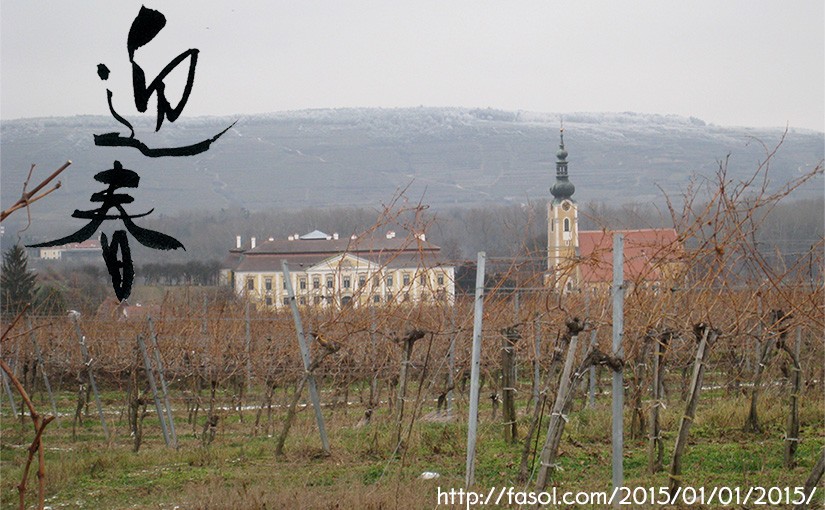The photograph shows the Gobelsburg Castle in Austria, you can see the location here on Google maps. A castle of this name is mentioned in 1178, and wine is grown in the region for about the last 1000 years.

Thoughts and analysis for 2015
Abenomics?!
The trick of course is the third arrow, the reforms. Read what Professor Takeo Hoshi has to say about Abenomics, Japanese economist, who has worked his way up US Universities, and has now reached the position of Professor of Economics at Stanford University. By the way, here is my talk at Stanford University – some years ago, but much of it still applies today.
Japan’s energy
Japanese people’s views on nuclear power are polarized, and its unclear and unpredictable when nuclear power stations will be switched on again in Japan. Read what the Governor of Niigata Prefecture has to say, who hosts the world’s largest nuclear power plant with 7 reactors and 8 GigaWatt capacity.
According to the Japanese Energy Fundamental Law, the Government has to publish an official Energy Basic Plan at regular intervals. You can read the 4th Energy Basic Plan published on April 11, 2014, and listen to a commentary on it for The Economist here on YouTube. The 4th Energy Basic Plan starts with the assumption that Japan is poor in natural energy resources, which of course is only true if we restrict “natural energy resources” to fossil resources. Japan is actually potentially very very rich in renewable energy sources, as the scenario plans developed by Japan’s Industry and Economy Ministry (METI) and Japan’s Environmental Ministry show.
Solid state lighting saves energy
GaN LEDs were invented and commercialized in Japan, and Shuji Nakamura, Isamu Akasaki and Hiroshi Amano won the 2014 Nobel Prize in Physics for this work. Read the summary of Shuji Nakamura’s keynote at the 5th Ludwig Boltzmann Forum.
Post-Galapagos and globalization of Japan’s technology groups
To overcome Japan’s Galapagos issues and to acquire technologies and market access, Japanese companies are acquiring overseas: read a list of Japanese acquisitions in Europe here.
Foreign companies in Japan, and Japanese companies overseas face a dilemma: expensive expatriates with limited local know-how, or local management? Japanese companies seem to have finally reached the conclusion that Japanese managers eg sent to Germany are in most cases not the best choice to lead a German-based multinational company – here are some great recent examples:
- Docomo acquires a majority stake in net mobile AG, however net mobile AG remains a publicly listed company. Read details here.
- NTT DATA acquires SAP solution provider itelligence AG, however itelligence AG remains an independently managed company under the founder’s management, and grows aggressively via acquisitions all over the globe. Read details here.
- NTT Communications acquires a majority of Integralis, Integralis is renamed NTT Com Security AG, however NTT Com Security AG remains traded on the m:access market of the Munich Stock Exchange. Read details here.
Carlos Ghosn is very well aware of such multi-cultural management issues and how to solve them, however too many EU companies in Japan are not. If they were, EU investments in Japan could be at least 50% higher – as you can read here.
Best wishes, and much success in 2015!
Copyright (c) 2015 Eurotechnology Japan KK All Rights Reserved


join the discussions